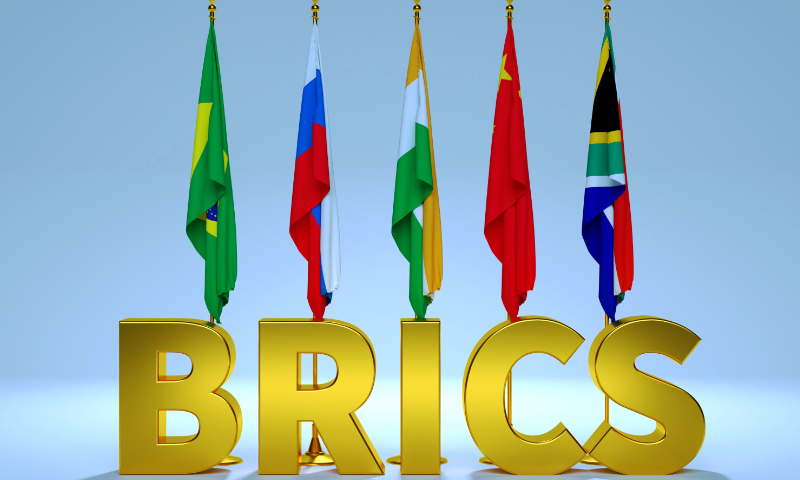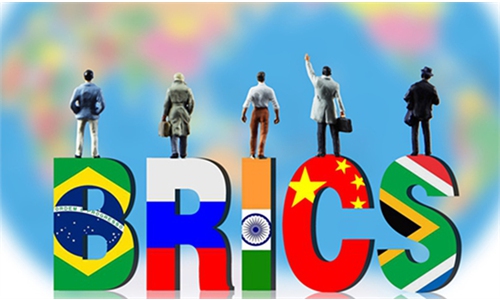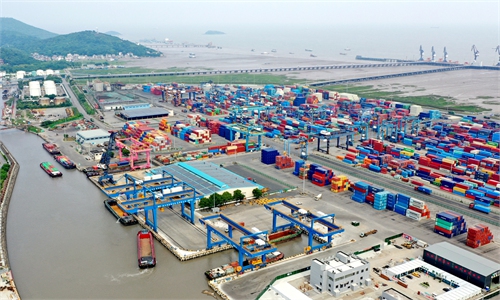
BRICS Photo: VCG
With the 14th BRICS Summit to be held on Thursday, business representatives from the bloc of emerging markets have high hopes for the multilateral mechanism to play a significant role in strengthening cooperation not only among its members, particularly trade with Russia and China-India trade, but also the broader developing world amid growing global uncertainties and challenges.
Industry observers said that the mechanism, against the backdrop of rising geopolitical tensions and growing disruptions caused by US hegemony, could create growth momentum for a post-pandemic recovery in the developing world, and strengthen pragmatic cooperation in such sectors as energy, raw materials and vehicles.
China is holding the rotating presidency of the bloc this year. In May, China's Foreign Ministry said it actively supports the expansion of the five-member group and broader "BRICS Plus" cooperation.
Certain progress on setting up a BRICS-led payment system, an alternative to the US dollar-dominated SWIFT system, could also be made, analysts predicted, at a time when an increasingly weaponized US dollar is prompting countries to promote local currency settlements.
"Russia is an important and active member of the BRICS grouping and has longstanding relationships with both India and China. The Russian private sector has shown renewed interest in engaging with Indian businesses, and we will see a significant rise of India-Russia trade in the near future," Mansoor Nadeem Lari, CEO of India-based trading facilitation organization Silk Route Trade and Industry Development Corp, told the Global Times on Tuesday.
India's top steelmaker Tata Steel imported about 75,000 tons of coal from Russia in the second half of May, the Economic Times reported, a move by the energy-hungry country with 1.4 billion people to diversify its energy imports. Russia has also jumped to India's No.2 crude oil supplier. Its crude oil imports from Russia rose from 100,000 barrels per day in February to 870,000 a day in May, according to media reports.
Lari said that although there may be short-term challenges in doing business in Russia due to the West's unilateral sanctions and pressure, in the long term, all the BRICS' private-sector enterprises will enjoy "huge business opportunities" in engaging with the Russian market.
"Both China and India are reliant on energy imports, a promising sector where BRICS countries could strengthen cooperation with Russia… The upcoming summit will be a major boost to deepen multilateral cooperation and bilateral trade flows," Chen Fengying, an economist and former director of the Institute of World Economic Studies at the China Institutes of Contemporary International Relations, told the Global Times on Tuesday.
In the first five months, China's bilateral trade with the other four BRICS countries stood at 1.31 trillion yuan ($196 billion), surging 12.1 percent year-on-year, or 3.8 percentage points higher than the overall trade growth rate, customs data showed.
According to analysts, consensus on cooperation could also be reached on building a more stable supply chain, as well as on resources and raw material trade. It is also expected that local currency settlement in foreign trade, or even the broader BRICS payment system, could yield progress.
Closer ties among BRICS members, which account for 40 percent of the world's population and 24 percent of global GDP, carry significance at a time when Washington is attempting to form a small clique to unilaterally levy sanctions and divide the world, observers said, stressing that these five non-Western emerging economies have the right to pursue development based on the BRICS spirit of "openness, inclusiveness and win-win cooperation."
"The world has not yet fully recovered from the coronavirus crisis, and the most vulnerable, especially in the developing and under-developed countries, have suffered a lot in the past two years," Lari said, noting that the BRICS framework works toward a positive outcome that not only benefits its five members but also other developing and regional economies.
He added that China and India are the two largest economies in the BRICS grouping and also among the top 10 economies of the world, so it is "imperative" for both to collaborate closely under the framework, not only to drive their own economies but also to act as a facilitator for other developing economies.
According to Lari, China and India - home to the world's second- and third-biggest start-up ecosystems - could tap more cooperation in emerging areas such as clean tech, health tech and fintech.
Also, bilateral investments from China and India in the manufacturing and services sector in neighboring areas will give a boost to the broader regional economies in South Asia and ASEAN, specifically the smaller nations which can benefit as being part of the larger global value and supply chain, he said.



